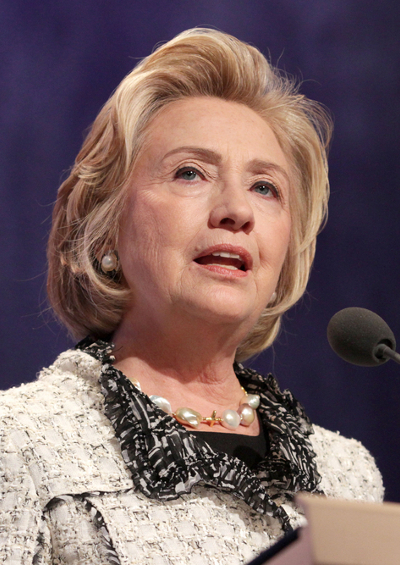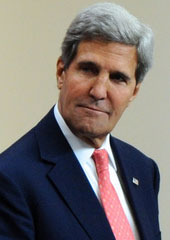Hillary Clinton: Lacking Smarts, Principles or Both?
Hillary Clinton attacks Obama’s foreign policy — she would be better off emulating it
August 27, 2014

Former U.S. Secretary of State Hillary Clinton has opened her informal presidential campaign by attacking President Obama by stating that the prescription “don’t do stupid sh-t” (D2S2) does not constitute a foreign policy.
In spite of justifiable criticisms for being reactive and indecisive, President Obama realizes two important facts. First, that massive American firepower is sometimes maddeningly powerless to affect political realities on the ground.
Second, that when employed, it can often make matters worse by producing damaging, unintended consequences. In foreign policy the choice is often between equally bad options.
Of course, offering a comprehensive foreign policy that does not eschew S2 is even worse. John Foster Dulles and his brother Allen directed a tightly Manichean foreign policy during the Eisenhower years that took America off course yielding six decades of blowback.
The equally Manichean Bush/Cheney/Rumsfeld years produced the war in Iraq that destabilized the Middle East, empowered Iran, stretched the U.S. military to the breaking point and made the United States arguably less secure —all for the neat projected price of $4-6 trillion and the lives of almost 4,500 American servicemen and women and hundreds of thousands of Iraqis and other civilians.
The Syria split
Unlike former Ambassador Robert Ford, who resigned when he disagreed with U.S. inaction, Secretary Clinton has chosen the timing of her book tour and campaign preparations to part ways with the President’s decision not to arm “moderates” in Syria in 2011, claiming that had the United States done so, there would be no ISIS threat in Iraq and Syria today.
That bold claim is made in spite of numerous academic studies, including those by George Washington University’s Marc Lynch and the University of Maryland’s David Cunningham, which conclude that the situation in Syria lacks the characteristics of the few instances in which outside aid in a civil war actually proved to be constructive.
The reality is that groups such as the Free Syrian Army which Clinton and Senator McCain would have armed — and which Turkey has been arming through the so-called “rat line” — have largely failed. They faded into groups against whom the United States now fights in Iraq or that are associated with al Qaeda or Salafist groups. They are “moderate” only in the most relativist sense.
Frequently, as President Obama has feared, the weapons rushed into such conflict areas — by capture, switching allegiances or sales on the black market — turn up aimed at U.S. forces.
Clinton control
In her five years at the helm of the U.S. State Department, Secretary Clinton never herself enunciated an overall design for U.S. foreign policy. So other evidence must be gleaned to predict what she would do if holding the reins in the White House. First, in the most critical foreign policy decision made in the last two decades, then-Senator Clinton voted to support the ill-conceived Iraq War.
Second, contrary to the logic she now states for taking action in Syria, she opposed the Iraq surge because of how it would play in the 2008 Democratic primaries. Her “principles” evidently only read so “deep.”
Third, Clinton was the decisive voice in the administration in convincing President Obama in what he called a 51-49 decision to intervene in Libya. As Professor Alan Kuperman of the Johnson School at the University of Texas has shown, the evidence cited by those arguing for intervention ranged from highly misleading to outright falsehoods.
In the end, it made matters in Libya much worse. The Libyan intervention is also damning in terms of the ability to direct an overall, coordinated foreign policy.
Intervening with the objective of regime change against a government that had engaged with the west on anti-terrorism and in giving up its nuclear program sent a very bad message to the Iranians with whom we are negotiating on nonproliferation.
The use of UN Security Council Resolution 1973 establishing a humanitarian no-fly zone to achieve regime change also incensed both the Russians and Chinese, who had cooperated on Libya making any UN consensus on Syria impossible and cooperation on Iran more complicated.
President Putin’s belief that he had been deceived in Libya reportedly made him view Western actions around Maidan Square last February with suspicion and may have played a role in his gross miscalculations in Crimea.
President Obama, who was accorded a caretaker role in dealing with two wars and the global financial crisis handed to him, will not go down in history as a great foreign policy president.
Yet his cautious sense of realism as to the limits of American power and resources are traits that his predecessor and most likely Democratic Party successor would do well to emulate.
Takeaways
#Clinton has criticized Obama for not giving arms to Syrian moderates. Did #Obama make the wrong call? #Syria
#Clinton supported intervention in Libya, war in Iraq and arms in #Syria. How trustworthy is her foreign policy?
President #Obama’s foreign policy is not memorable, but it is realistic. #Clinton should emulate it, not attack it.

